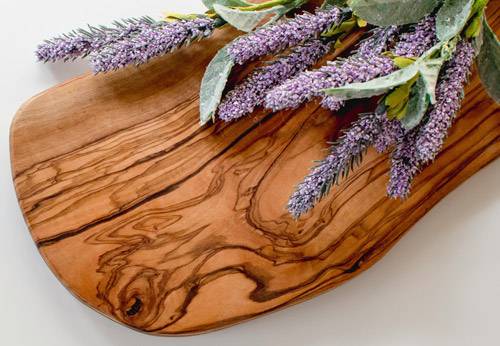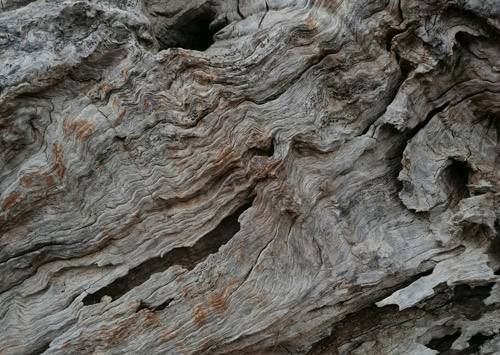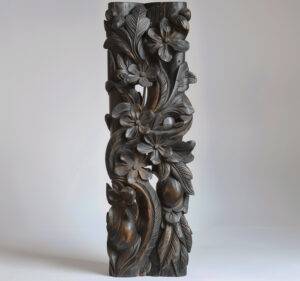Olive tree
Olive wood adds Mediterranean charm and rustic elegance to any setting. The distinctive grain is created by the slow growth of the olive tree and makes the wood particularly striking. It is hard, odourless and easy to care for.
The olive tree, which has been honoured for thousands of years, is a symbol of health and prosperity. As one of the longest-lived trees in Europe, it can live for up to 2000 years and is characterised by its compact shape and frugality.
The oily and water-repellent olive wood is particularly valuable due to its density, hardness and durability. With its unique grain and antiseptic properties, it is ideal for bowls, cutlery and chopping boards as well as for making brushes.

Information on olive tree wood:
- Olive tree wood is a sustainable alternative in the kitchen
- It has natural antibacterial properties
- Olive tree wood is durable and resistant
- It improves the flavour of food and is easy to clean and maintain
- Olive tree wood is an aesthetic highlight in the kitchen
Olive wood as a sustainable alternative
One of the outstanding properties of olive tree wood is its sustainability. In contrast to other materials such as plastic or metal, olive tree wood is obtained from renewable resources. The cultivation of olive trees does not require large amounts of water or pesticides and thus contributes to reducing the ecological footprint.
In addition, olive tree wood is biodegradable and can be composted at the end of its life. Compared to plastic products, it leaves no harmful residues in the environment and thus contributes to the preservation of our ecosystems.
Natural antibacterial properties
Another advantage of olive tree wood is its natural antibacterial effect. Studies have shown that the wood contains certain antimicrobial compounds that can inhibit the growth of bacteria. This makes it a hygienic choice for the kitchen.
The natural antibacterial properties of olive wood help to ensure food safety. By using olive wood chopping boards or cooking utensils, potentially dangerous bacteria can be reduced, resulting in healthier food preparation.
No chemical additives in the kitchen
Another reason why olive wood is popular in the kitchen, compared to plastic, is its freedom from harmful chemicals. Plastic products can contain substances such as BPA or phthalates that could be released on contact with food.
Using olive wood in the kitchen therefore offers a safe alternative for food preparation and contact. There is no need to worry about possible harmful health effects from the use of chemically treated wood or plastics.
Durability and resilience
Olive wood is also characterised by its durability and resistance. Compared to other materials such as plastic or ceramic, it is less susceptible to scratches and signs of wear.
The wood is hard and dense, which makes it highly resistant to moisture. This makes it ideal for use in the kitchen, where it frequently comes into contact with water or other liquids.
In addition, olive wood retains its natural beauty even with regular use. It can last for years and is therefore an investment in high-quality kitchen utensils.

Improving the flavour of food
Another notable benefit of using olive wood in the kitchen is its ability to enhance the flavour of food. The wood gives off a subtle but pleasant fragrance when cooking or serving, which carries over to the flavours of the food.
Olive wood can add an extra hint of smoky flavour, especially to grilled dishes or dishes cooked in the oven. This can help to make your meals even more appetising and appealing.
Easy cleaning and care
Cleaning and caring for olive wood kitchen utensils is simple and straightforward. It is recommended to wash them with warm water and mild soap after use. However, avoid soaking the wood for long periods of time or washing it in the dishwasher.
To maintain the wood and preserve its natural beauty, you can rub it regularly with a special olive oil for wooden furniture. This keeps the wood supple and protects it from drying out.
Proper care of your olive wood kitchen utensils guarantees their longevity and ensures that you will enjoy them for many years to come.
Olive wood as an aesthetic highlight in the kitchen
In addition to all the practical benefits, olive wood is also an aesthetic highlight in the kitchen. The wood has a warm, natural colour and a striking grain that adds a touch of elegance to any kitchen.
It can be used in a variety of decorative ways. From chopping boards to salad bowls and wooden spoons, kitchen utensils made from olive wood are not only functional but also eye-catching.
What’s more, the natural look of olive wood goes well with different interior styles and colour schemes. It can be used in both modern and rustic kitchens, adding a touch of naturalness and warmth.
Conclusion
The use of olive tree wood in the kitchen offers numerous advantages. It is a sustainable alternative to other materials, has natural antibacterial properties, contains no harmful chemicals, is durable and resistant, improves the flavour of food, is easy to clean and maintain and serves as an aesthetic highlight.
If you want to equip your kitchen with high-quality utensils made from olive wood, you should definitely consider these benefits. It’s not just the environmental and health benefits of using olive wood – you’ll also enjoy cooking with these beautiful pieces and impressing your guests.

FAQs
What is olive tree wood?
Olive tree wood is the wood of the olive tree, which grows mainly in the Mediterranean region. It is a hard and dense wood that is used in the kitchen and in the home due to its durability and beauty.
What are the health benefits of olive tree wood in the kitchen?
Olive tree wood has antibacterial properties and is resistant to moisture and stains. It is also hypoallergenic and does not contain harmful chemicals that can leach into other types of wood. In addition, it is a sustainable material that is biodegradable.
How can olive tree wood be used in the kitchen?
Olive tree wood can be used for various kitchen utensils such as chopping boards, serving platters, salad bowls, spoons and forks. It can also be used for furniture such as tables and chairs.
How do I care for olive tree wood in the kitchen?
Olive wood should be rubbed regularly with olive oil to protect it and maintain its beauty. It should also be washed by hand and not cleaned in the dishwasher. To remove stains, it can be cleaned with a mixture of lemon juice and salt.





